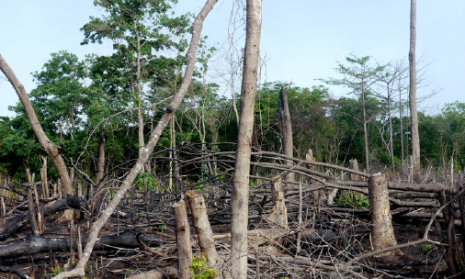Weak international institutions prevent the full benefits of science based innovation being secured for consumers or the environment

Solutions and confrontations
Two of the papers in this edition shed light on assertions commonly made by pressure groups.
Murphy, contrary to their claims, shows that expanding plantation palm oil production gives a smaller environmental footprint than traditional small-scale production.
Haslam et al., explain the inability of capture fisheries to sustain the level of demand for long chain Omega 3 fatty acids, necessary to meet the nutritional needs of farmed fish of which there is a greatly increased rate of production, demanded by a growing human population.
They show that the feed requirements of farmed fish may be satisfied by modified vegetable oils, rather than by depleting stocks of sea fish. In both papers the key technology needed to meet growing demand whilst minimising environmental costs depends upon genetic manipulation.
Both papers offer grounds for optimism that, at a time when predicted growth of demand from rising numbers of people and rising income, technology can offer the prospect of reducing further pressures on the natural environment.
If production is limited to current technology there are likely to be limitations on sustainable supplies that will require either, some reduction in the numbers of people, or a reduction in per-capita consumption, effectively a reduction in real income.
Neither strategy is politically acceptable. Inaction will mean that the burden of adjustment will fall on people who are economically weakest, owing to an inevitable increase in prices as supplies diminish.
In contrast these papers show, for two important areas, palm oil and fish oil supplies of ‘omega 3’, productivity can be substantially increased without irreparable damage to the environment.
Innovation at this fundamental level means moving into territory that is new. That means facing up to the possibility of unrecognised and damaging side effects for either human health or the environment. If we are to exploit such possibilities we need to abandon the negative philosophy of the precautionary principle and establish a well equipped, broadly based and trusted system of monitoring.
This must be the responsibility of government, ideally but probably impracticably, on a global basis. Such a service must command the confidence of the public. In doing so it needs not only to publish its own monitoring reports but also address, and where necessary contest, positions adopted by pressure groups – one of the functions of World Agriculture.
Research and development are not luxuries but necessities, if we are to cope with the challenges that lie ahead. Innovations that increase productivity often emerge from interactions between scientists in their own specialist languages.
To discover and apply such productivity-enhancing possibilities needs research to be communicated in language that is understood by policy makers and decision takers.
Communication should be a two way process. Scientists need to be aware of what communities want so that they recognise the potential of their new discoveries. World Agriculture provides one route through which this communication can take place.
The importance of a global view
A second feature common to these papers is the need to visualise both problems and solutions on a global basis.
National boundaries are artificial and political decisions in one location often have unrecognised repercussions on natural processes in distant places. Production of palm oil, greatly in demand in high and middle-income countries, has expanded dramatically in Indonesia and Malaya bringing changes in wildlife habitat, the decline of traditional communities and exposing the economic stability of both countries to fluctuations in the world price of oil.
Similarly, increased success in locating and capturing fish has threatened the sustainability of fish populations and destroyed the livelihoods of traditional fishing communities that have no alternative source of income.
Palm oil production is concentrated in S E Asia but its impact on the natural environment may affect the welfare of communities in other continents.
Deforestation in order to increase food supplies can have adverse consequences for climate change.
The loss of biodiversity, as traditional habitats are destroyed, may not only destroy treasured wild life but deprive the world of genetic resources.
The need to control pests and overcome diseases that threaten economically productive farming not only reduces bio-diversity but also may reduce the aesthetic value of landscapes. Success in producing more food is likely to result in increased pressure on natural water supplies.
The tensions that result may lead to conflicts between countries dependent on the same natural sources of water. In all these areas we need a regulatory framework that takes a world wide view.
Attempts to reach a global consensus on action to regulate the exploitation of natural resources have demonstrated the impotence of international institutions.
Governments, faced by environmental problems that are geographically or temporally remote are likely to give greater weight to competing demands from local, well-organised pressure groups. Retaining power depends on those whose votes will determine their own continuation in office.
Prestige abroad will not win votes at home. As a result international agreements, and their enforcement, tend to proceed at the rate of the most reluctant.
These papers offer prospects for more efficient resource use by employing genetically modified materials. If this is frustrated by restrictions on trade in GM products the result will be avoidable environmental and economic cost for the world as a whole.
Most of the world’s population seek a higher standard of living. But such goals are unattainable if productivity levels do not increase.
The rejection of productivity-increasing innovation not only penalises those who are now poor but eventually will impose a decline in living standards on many who are currently affluent.
Such a prospect stresses the importance for global welfare that we learn to use available natural resources more efficiently.
The papers by Murphy and Haslam et al. provide an example of how science can contribute to resolve problems in specific product areas to improve efficiency and safeguard natural resources for the world community as a whole.

